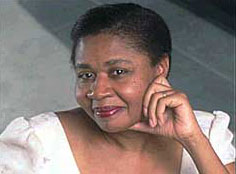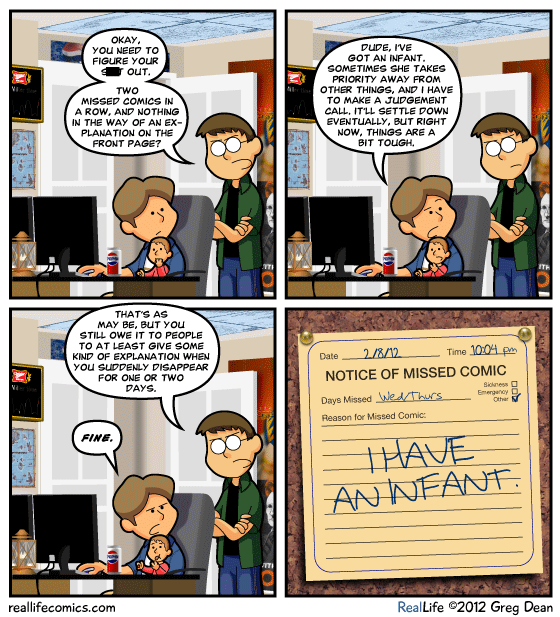Friday… finally.
business and economy, computers, education, event, everyday glory, family and friends, food for thought, geekery, history, music, news and info, politics and law, Whiskey Tango Foxtrot...?! February 10th, 2012Friday – 10 February 2012
It’s my working Friday. As usual, it’s the “quiet” day in the office.
Last night, Melissa came over to help me square the girls away for the night, while SaraRules! attended a Justice League function. The girls were fine… until right before bedtime, when Diana decided she’d had “enough.” She was tired and thus whiny/crying. Amusingly, when it was time for sweet potatoes, she would cry, then eat a spoonful, wait a moment then… whimper/almost cry (or, her new favorite: grunt) before taking another spoonful. Not-so-miraculously, all problems were solved when she got her bottle. And, the girls were awake, post-feeding, just long enough for a bedtime story from Auntie M: Pajama Time! After the girls were down – which didn’t take long at all – Melissa ran over to Greek City Grill to get us dinner.
Chew on This: Food for Thought – Black History Month
You’re getting another two-for-one today:
- Jamaica Kincaid, is a Caribbean novelist, gardener, and gardening writer.

Jamaica Kincaid was born on May 25, 1949, as Elaine Cynthia Potter Richardson in the city of St. John’s on the island of Antigua in the nation of Antigua and Barbuda. She immigrated to the United States at 16 and later became a U.S. citizen. Changing her name (1973), she became a New Yorkerstaff writer in 1976, working there until 1996.Kincaid first became known for her lush tales of Caribbean life—in her first short-story collection, At the Bottom of the River (1983), and in Annie John(1985), a semiautobiographical series of related stories that explore the complexity of mother-daughter connections. Her later fiction continues the style and themes of these works. Dark and personal, they often feature clear-eyed yet lyrical portraits of everyday reality in the post-colonial West Indies.Her novels are loosely autobiographical, though Kincaid has warned against interpreting their autobiographical elements too literally: “Everything I say is true, and everything I say is not true. You couldn’t admit any of it to a court of law. It would not be good evidence.” Her work often prioritizes “impressions and feelings over plot development” and often features conflict with both a strong maternal figure and colonial and neocolonial influences.Her novels include Lucy (1990), The Autobiography of My Mother (1996), and Mr. Potter (2002). Kincaid has also written nonfiction, notably A Small Place (1988), a long and angry essay on Antigua, and My Brother (1997), an incantatory memoir of her brother’s death from AIDS. An enthusiastic and knowledgeable gardener, she is also the author of many essays on the subject and of My Garden (Book)(1999).
She lives with her family in North Bennington, Vermont, during the summers and teaches at Claremont McKenna College in Claremont, California, during the academic year.
- Eartha Kitt was an American singer, actress, and cabaret star.

Eartha Mae Kitt (January 17, 1927 – December 25, 2008) was bornon a cotton plantation in North, a small town in Orangeburg County near Columbia, South Carolina. Kitt’s mother was of Cherokee and African-American descent and her father of German or Dutch descent.Kitt was raised by Anna Mae Riley, a woman whom she believed to be her mother. Upon Riley’s death, she was sent to live in New York City with Mamie Kitt, who she learned was her biological mother. She had no knowledge of her father, except that his surname was Kitt and that he was supposedly a son of the owner of the farm where she had been born.At 16 she joined Katherine Dunham‘s dance troupe, touring the United States, Mexico, South America, and Europe. When the Dunham company returned to the United States, the multilingual Kitt – she spoke four languages and sang in seven – stayed in Paris, where she won immediate popularity as a nightclub singer.
In 1950, Orson Welles gave Kitt her first starring role, as Helen of Troy in his staging of Dr. Faustus. A few years later, she was cast in the revue New Faces of 1952, introducing “Monotonous” and “Bal, Petit Bal”, two songs with which she is still identified. Throughout the rest of the 1950s and early 1960s, Kitt recorded; worked in film, television, and nightclubs; and returned to the Broadway stage. In 1964, Kitt helped open the Circle Star Theater in San Carlos, California. In the late 1960s, the television series Batmanfeatured her as Catwoman after Julie Newmar left the role.
After she publicly criticized the Vietnam War at a 1968 White House luncheon in the presence of the first lady, Lady Bird (Claudia) Johnson, Kitt’s career went into a severe decline; in the 1970s it began to recover after news surfaced that she had been subjected to U.S. Secret Service surveillance. She returned to New York in a triumphant turn in the Broadway spectacle Timbuktu! (a version of the perennial Kismetset in Africa) in 1978.n 1984, she returned to the music charts with a disco song, Where Is My Man, the first certified gold record of her career. “Where Is My Man” reached the Top 40 on the UK Singles Chart, where it peaked at #36; The song also made the Top 10 on the US Billboard dance chart, where it reached #7. Kitt found new audiences in nightclubs across the UK and the US, including a whole new generation of gay male fans, and she responded by frequently giving benefit performances in support of HIV/AIDS organizations.
In 1991, Eartha returned to the screen. In the late 1990s, she appeared as the Wicked Witch of the West in the North American national touring company of The Wizard of Oz. In 2000, Kitt again returned to Broadway. Beginning in late 2000, she starred as the Fairy Godmother in the US national tour of Cinderella alongside Deborah Gibson and then Jamie-Lynn Sigler. One of her more unusual roles was as Kaa the python in a 1994 BBC Radio adaptation of The Jungle Book. Kitt lent her distinctive voice to the role of Yzma in Disney’s The Emperor’s New Groove, for which she won her first Annie Award, and returned to the role in the straight-to-video sequel Kronk’s New Groove and the spin-off TV series The Emperor’s New School, for which she won two Emmy Awards and two more Annie Awards (both in 2007–08) for Voice Acting in an Animated Television Production.
Kitt was the spokesperson for MAC Cosmetics’ Smoke Signals collection in August 2007. She re-recorded Smoke Gets In Your Eyes for the occasion, was showcased on the MAC website, and the song was played at all MAC locations carrying the collection for the month.
Kitt became a vocal advocate for homosexual rights and publicly supported same-sex marriage, which she believed to be a civil right. She had been quoted as saying, “I support it [gay marriage] because we’re asking for the same thing. If I have a partner and something happens to me, I want that partner to enjoy the benefits of what we have reaped together. It’s a civil-rights thing, isn’t it?”
Kitt died from colon cancer on Christmas Day 2008 at her Weston, Connecticut, home.
Information courtesy of Biography.com, FactMonster.com, and Wikipedia.
Stray Toasters
- Utah Symphony: Falling in love with Beethoven’s Fourth
I believe that tickets are still available for these performances. - 20 Common Grammar Mistakes That (Almost) Every Makes
- Gunslingers Convene for Rootin’ Tootin’ Period Fun

- Education Gap Grows Between Rich and Poor, Studies Say
- Surviving a Hack
- Agreed! Doubly so in our case!

- Serial killer John Wayne Gacy had accomplices, lawyers say
- How Your Cat Is Making You Crazy

- Google’s First Employee Departs
Namaste.
One Response to “Friday… finally.”
Leave a Reply
You must be logged in to post a comment.

February 11th, 2012 at 5:59 AM
And Kitt, despite a storied life, will always be first remembered for playing Catwoman.
(And, for me, Emperor’s New Groove.)